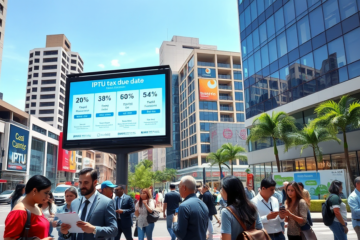Inequality in Access to Washing Machines
Washing machines They are essential household appliances that make household routines easier, but inequality in access to these items is still a reality in Brazil.
This article examines data from the Continuous National Household Survey (PNAD Contínua), which reveals that almost a third of Brazilian families do not own this device.
The situation is even more worrying in the Northeast, where only 40.5% of households have access to washing machines, contrasting with 90% in the South of the country.
We will also address the growth in the acquisition of these appliances and the impact of income, purchasing power, and infrastructure in different regions of Brazil.
Washing Machine Access Overview
According to the Continuous National Household Sample Survey (PNAD Contínua), access to washing machines in Brazil has shown significant growth in recent years.
In 2024, 70,4% of households had this essential appliance, representing an increase of 7.4 percentage points compared to 2016. This increase, however, is not uniform across the country, highlighting the striking regional disparities, especially between the Northeast and the South.
In the Northeast, only 40.5% of homes have the equipment, while in the South this number rises to significant 90%.
These differences exemplify how income influenced the ownership of durable goods in these areas.
In addition to economic disparity, other factors contribute to the unequal access to washing machines, such as infrastructure and housing characteristics.
Families in poorer regions often live in limited spaces, making it difficult to accommodate bulky appliances.
In this context, it is important to consider that improvements in infrastructure and housing conditions can facilitate the acquisition of these goods.
A close look at regional inequalities and challenges helps to better understand the dynamics of electronics and home appliance consumption in Brazil, as illustrated by data from Continuous National Household Sample Survey (PNAD).
Regional Disparities in Brazil
Regional inequality in Brazil is a historical phenomenon that manifests itself in various economic and social dimensions.
In the Northeast, only 40.5% of households have a washing machine, while in the South this figure reaches 90%, revealing a significant disparity in access to consumer goods.
These differences reflect inequalities in income, investment and infrastructure between regions, directly impacting the population's comfort and quality of life.
Northeast versus South in Detail
The contrast between the Northeast and South of Brazil in terms of washing machine ownership reflects the profound economic inequalities between the regions.
In the Northeast, only 40,5% of households have this crucial appliance, while in the South, this number reaches 90%, an indicator of how lower average income and limited infrastructure impact the acquisition of these goods.
According to the IBGE, these factors generate a “direct impact on the domestic routine”.
While the South enjoys a higher average income and a greater availability of credit, facilitating access to durable goods, the Northeast faces challenges that hinder this progress.
The increase of 7.4 percentage points Machine ownership since 2016 shows progress, but regional disparities still persist, highlighting the importance of public policies focused on improving purchasing power and infrastructure in the Northeast to balance this balance of opportunities.
Evolution from 2016 to 2024
Between 2016 and 2024, the percentage of Brazilian households with a washing machine increased by 63,0% to 70,4%, that is, an increase of 7.4 percentage points This gradual growth reflects economic improvements and the expansion of consumer credit. Below are some milestones that explain this progress:
- 2016: Beginning of economic recovery in Brazil, driven by policies to encourage consumption
- 2018: Increased credit supply, facilitating the acquisition of durable goods, including washing machines
- 2020: COVID-19 pandemic causes changes in consumption habits and prioritization of household comfort items
- 2023: Awareness campaigns on energy efficiency and sustainability are beginning to influence the choice of more modern and economical models
During these years, access to goods such as washing machines was directly influenced by family income and home infrastructure In the Northeast, only 40,5% of households have the appliance, contrasting sharply with the South, where this number reaches 90%.
This regional discrepancy highlights the importance of policies that aim to social equity in access to essential consumer goods.
For more information on this development, see the Continuous PNAD.
Main Barriers to Purchasing Home Appliances
The acquisition of washing machines in Brazil still faces significant obstacles, despite a 7.4 percentage point increase in the number of households with this appliance between 2016 and 2024. A determining factor is the insufficient income, especially in regions like the Northeast, where purchasing power is lower.
This point is addressed by a study on the inequalities in access to goods.
Furthermore, the limited infrastructure In certain Brazilian homes, this difficulty is amplified, since many residences do not have the necessary connections or adequate sewage systems to install a washing machine.
Another crucial aspect is the lack of physical space in densely populated urban areas, where the housing structure does not favor the inclusion of new appliances. It is clear that, to increase access to this facility, investments in housing and economic policies that address the structural causes of this inequality would be essential.
| Factor | Description | Impact |
|---|---|---|
| Income | Low-middle income | Makes purchase difficult |
| Infrastructure | Lack of adequate connections | Installation restriction |
| Space | Limited housing structure | Impossibility of accommodation |
Washing machines are a symbol of social inequality in Brazil, reflecting the economic and structural challenges faced by many families.
Ensuring access to these appliances is crucial to improving quality of life and promoting equity in the country.



0 Comments